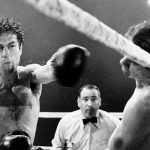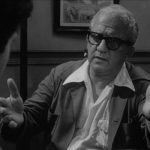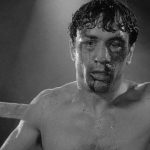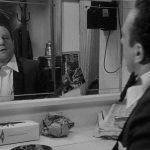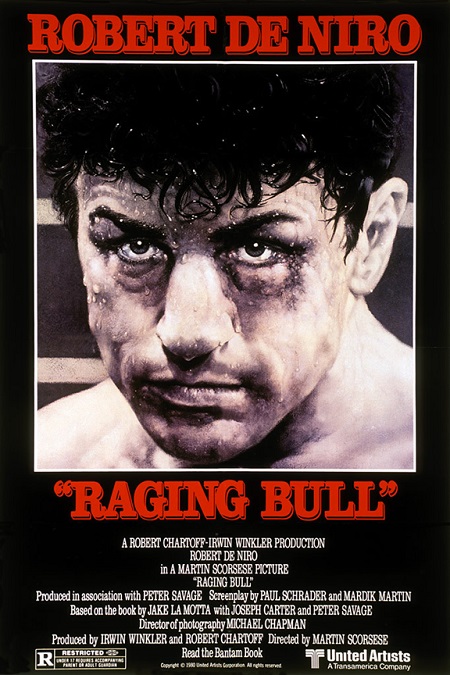
Raging Bull – 1980
Raging Bull was a biopic film about professional prize-fighter Jake LaMotta. Robert De Niro took the lead and turned in a really surprising performance. It was very impressive, considering the physical changes the actor undertook to play the part. The character had two different physical personas. First, there was the lean, mean, fighting machine. When he was in training and in the ring, he was in prime condition, weighing in at 145 lbs. The second was LaMotta’s post-boxing years, where he gained an amazing 60 lbs, bringing him up to 215 lbs.
Just as an interesting note, I found that De Niro gained all the weight by going on a culinary tour of Italy and France, bingeing on three large meals every day, with lots of pasta, meat, butter, ice cream, and beer. He put the weight on in only 4 months and was quoted as saying, “The first 15 lbs was fun. The rest was hard work.” I call that real dedication to the role!
The biggest problem I had with the film is that the main character, Jake LaMotta, was the least likeable character in the entire film. Joe Pesci and Cathy Moriarty played the top supporting cast, Jake’s brother and manager Joey LaMotta, and Jake’s wife Vickie. They were both good people who did their best to support Jake, while putting up with being abused and mistreated by him.
One of the first scenes in the movie shows Jake at home with his first wife. She is making him dinner and he picks a fight with her. The argument escalates into shouting, and eventually, he hits her. And that was it. I lost all respect for the character. Then he sees the beautiful Vickie, falls in love with her, pursues her, and cheats on his wife with her. My respect level for him just kept dropping and dropping. Then, eventually, after he marries Vickie, the pattern continues, and he starts to beat her as well.
It is hard for me to like a character, or a movie, for that matter, when the main protagonist is such a terrible person. But that wasn’t the actor’s fault. De Niro did a great job creating an unlikeable character. Pesci and Moriarty, were both able to keep up with him and turned in some good performances as well.
The film follows LaMotta’s career as he works and strives for a shot at the title. He goes into the boxing ring over and over again, winning fight after fight, except the one in which he is manipulated by the local mob boss, Tommy Como, played by Nicholas Colasanto, into taking a dive. Eventually, he succeeds in becoming the middleweight champion. He seems to have it all: a successful career, money, a beautiful wife, and a loving family. But he becomes an irrationally jealous husband, accusing the innocent Vickie of having an affair with Joey. He assaults Joey in front of his family, driving him away for good.
But then the movie also follows the man after his boxing career is over. After losing the champion title to his long time professional rival, Sugar Ray Robinson, played by Johnny Barnes, he puts on weight and becomes a sleazy lounge act, telling bad jokes to drunk crowds who barely listen to him. He buys his own night club, but his new career quickly spirals as he is found guilty of introducing underage girls to men in his bar. Vickie leaves him and threatens to call the cops is he ever comes near her.
The end of the film is a sad commentary of a man who could have had it all, if only he had been a little smarter in his personal life. He certainly had the ability and the drive to be the best in the ring. And when it comes down to it, maybe that is why I feel so ambivalent about the film, in general. I couldn’t tell if I was supposed to be sympathetic to his character or not. Was I supposed to forgive him for how he abused those who cared about him? Was I supposed to feel sorry for him because he lost everything? I don’t know.
And just as a final thought, I have to mention that I was originally disappointed that the film was black and white. But after reading director Martin Scorsese’s reasons for making that choice, I can see why he did it. Apparently, he wanted to differentiate the film from Rocky, which had come out just 4 years earlier, and also for period authenticity. Also, Scorsese didn’t want to show all the blood in the boxing scenes in color.
